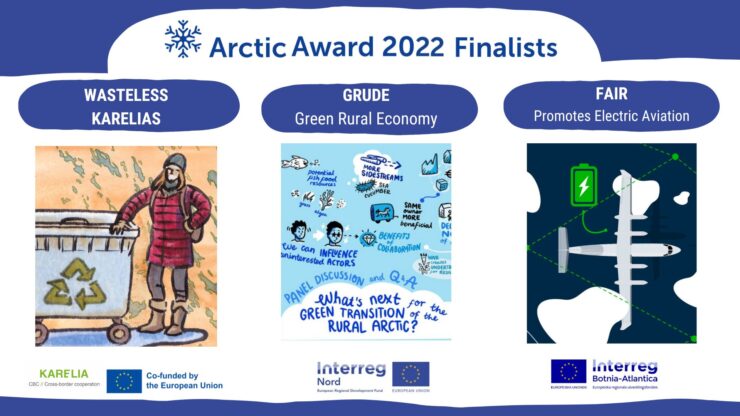Following a break in 2021, the Arctic Awards are back to highlight exceptional projects focusing on topics of particular relevance to the Arctic area.

This year all five original 2014-2020 Arctic Cooperation Programmes – Northern Periphery and Arctic Programme 2014-2020, Interreg Botnia-Atlantica, Interregnord, Kolarctic CBC and Karelia CBC Programme – have nominated two projects each that focus on sustainable development in the Arctic, with a strong involvement of people in the Arctic.
During October and November all 10 nominated projects have been featured by the Arctic Cooperation with the hashtag #ArcticAwards2022. On 1st November a jury selected the three finalist projects which are now participating in an online competition to become the Arctic Awards 2022 winner. It is now up to YOU to decide the one and only winner!
Vote your favourite project on https://www.surveymonkey.com/r/ArcticAwards2022 before 25th January 16.00 EET.
An awarding ceremony will take place on 25th January in Oulu, as part of the Capitalisation event hosted by Karelia and Kolarctic programmes.
Follow #ArcticCooperation and #ArcticAwards2022 to find out who will be the winner!
Meet the 2022 Arctic Awards Finalists
You can meet all Arctic Awards selected projects and the finalists on the Arctic Cooperation facebook page.
Finalist #1 – WasteLess Karelias
The project has established waste collection and sorting facilities in villages. Before the project, in the Finnish villages distances to waste collection and sorting facilities were long, and the Russian villages practically had no proper facilities in place. Over the span of the project 11 collection points for mixed and/or sorted waste have been built by WasteLess.
The project has done Capacity building to increase waste management skills and possibilities of local residents and village administrations, and carried out waste related education in local schools.
All activities have directly benefited the residents in the region as they have directly improved their living environments. Activities have further improved the ability of residents to extend the project messages to other places, and thus multiply the results.
Visit the project website or watch a video about WasteLess Karelias.
Finalist #2 – GRUDE – Green Rural Economy
The project has collected, refined and shared knowledge about green economy and resource efficiency in order to create sustainable Arctic societies.
Green Economy is a great opportunity for Northern sparsely populated regions to benefit from local natural resources and inhabitants competence. The actual beneficiaries of the green economy are municipalities, businesses and local inhabitants.The project has arranged over 60 events, both regional and international, with a wide variety of circular economy-related themes, targeted at different audiences: public sector and decision makers, local SMEs, and residents.
All activities have directly benefited the residents, by the positive development of their municipalities and surrounding businesses.
Visit the project website or listen to this interview with Janne Mustonen, a reindeer herder from the Finnish Lapland.
Finalist #3 – FAIR
Finding innovations to Accelerate the Implementation of electric Regional aviation.
The project has promoted the early implementation of electric aviation in the Kvarken-Nordland region. This is an Arctic region spanning over mountains, inland and sea and it is a region that shares many traits with other parts of the Arctic, such as long distances between population centres and poor existing transport alternatives. This new technology can thus connect the region in an efficient way and enable further cooperation within the Arctic region and across borders.
New electric air routes can make life easier for the people living in the Arctic region – fast sustainable traveling makes it possible to commute to more work opportunities and to access more services and destinations.
What could regional electric air travel sound like?
Visit the project website or board the plane yourself as you go on a trip in the future: from your home in Lycksele (SE) to the airport in Vaasa (FI) in the year 2040.